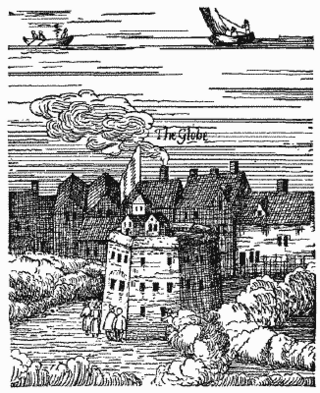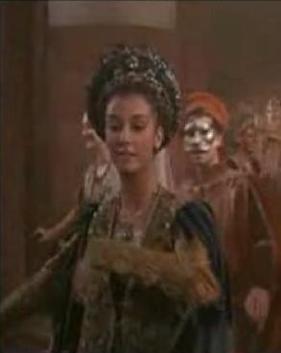
Romeo and Juliet is a tragedy written by William Shakespeare early in his career about the romance between two Italian youths from feuding families. It was among Shakespeare's most popular plays during his lifetime and, along with Hamlet, is one of his most frequently performed. Today, the title characters are regarded as archetypal young lovers.

English Renaissance theatre, also known as Renaissance English theatre and Elizabethan theatre, refers to the theatre of England between 1558 and 1642.

Shakespeare in Love is a 1998 period romantic comedy film directed by John Madden, written by Marc Norman and Tom Stoppard, and produced by Harvey Weinstein. It stars Gwyneth Paltrow, Joseph Fiennes, Geoffrey Rush, Colin Firth, Ben Affleck and Judi Dench.

Shoreditch is an area in London, England and is located in the London Borough of Hackney alongside neighbouring parts of Tower Hamlets, which are also perceived as part of the area due to historic ecclesiastical links. Shoreditch lies just north-east of the border with the City of London and is considered to be a part of London's East End.

Richard Burbage was an English stage actor, widely considered to have been one of the most famous actors of the Globe Theatre and of his time. In addition to being a stage actor, he was also a theatre owner, entrepreneur, and painter. He was the younger brother of Cuthbert Burbage. They were both actors in drama. Burbage was a business associate and friend to William Shakespeare.

The Globe Theatre was a theatre in London associated with William Shakespeare. It was built in 1599 at Southwark, close to the south bank of the Thames, by Shakespeare's playing company, the Lord Chamberlain's Men. It was destroyed by fire on 29 June 1613. A second Globe Theatre was built on the same site by June 1614 and stayed open until the London theatre closures of 1642. As well as plays by Shakespeare, early works by Ben Jonson, Thomas Dekker and John Fletcher were first performed here.

The Rose was an Elizabethan theatre. It was the fourth of the public theatres to be built, after The Theatre (1576), the Curtain (1577), and the theatre at Newington Butts – and the first of several playhouses to be situated in Bankside, Southwark, in a liberty outside the jurisdiction of the City of London's civic authorities. Its remains were excavated by archaeologists in 1989 and are listed by Historic England as a Scheduled Monument.

The Theatre was an Elizabethan playhouse in Shoreditch, just outside the City of London. Built in 1576, after the Red Lion, it was the first permanent theatre built exclusively for the showing of theatrical productions in England, and its first successful one. Actor-manager James Burbage built it near the family home in Holywell Street. The Theatre's history includes a number of important acting troupes including the Lord Chamberlain's Men, which employed Shakespeare as actor and playwright. After a dispute with the landlord, the theatre was dismantled and the timbers used in the construction of the Globe Theatre on Bankside.

The Curtain Theatre was an Elizabethan playhouse located in Hewett Street, Shoreditch, just outside the City of London. It opened in 1577, and continued staging plays until 1624.
The Lord Chamberlain's Men was a company of actors, or a "playing company", for which William Shakespeare wrote during most of his career. Richard Burbage played most of the lead roles, including Hamlet, Othello, King Lear, and Macbeth. Formed at the end of a period of flux in the theatrical world of London, it had become, by 1603, one of the two leading companies of the city and was subsequently patronized by James I.

Shakespeare's Globe is a realistic true-to-history reconstruction of the Globe Theatre, an Elizabethan playhouse first built in 1599 for which William Shakespeare wrote his plays. It is located on the south bank of the River Thames, in the London Borough of Southwark and hosts theatrical productions.
Goodnight Desdemona (Good Morning Juliet) is a 1988 comedic play by Ann-Marie MacDonald in which Constance Ledbelly, a young English literature professor from Queen's University, goes on a subconscious journey of self-discovery.

St Leonard's, Shoreditch, is the ancient parish church of Shoreditch, often known simply as Shoreditch Church. It is located at the intersection of Shoreditch High Street with Hackney Road, within the London Borough of Hackney in East London. The current building dates from about 1740 and is Grade I listed. The church is mentioned in the line ""When I grow rich", say the bells of Shoreditch" from the nursery rhyme Oranges and Lemons.

The Fortune Playhouse was an historic theatre in London. It was located between Whitecross Street and the modern Golden Lane, just outside the City of London. It was founded about 1600, and suppressed by the Puritan Parliament in 1642.

Rosaline is a fictional character mentioned in William Shakespeare's tragedy Romeo and Juliet. She is the niece of Lord Capulet. Although an unseen character, her role is important: Romeo's unrequited love for Rosaline leads him to try to catch a glimpse of her at a gathering hosted by the Capulet family, during which he first spots her cousin, Juliet.

Thousands of performances of William Shakespeare's plays have been staged since the end of the 16th century. While Shakespeare was alive, many of his greatest plays were performed by the Lord Chamberlain's Men and King's Men acting companies at the Globe and Blackfriars Theatres. Among the actors of these original performances were Richard Burbage, Richard Cowley, and William Kempe.

Kill Shakespeare is a twelve-issue comic book limited series released by IDW Publishing. It was produced by Anthony Del Col and Conor McCreery, who also served as co-writers, with Andy Belanger as artist, Ian Herring as colourist, and Kagan McLeod as cover artist. The first issue was published on April 14, 2010.
The year 2011 in archaeology
The year 2012 in archaeology involved some significant events.

















